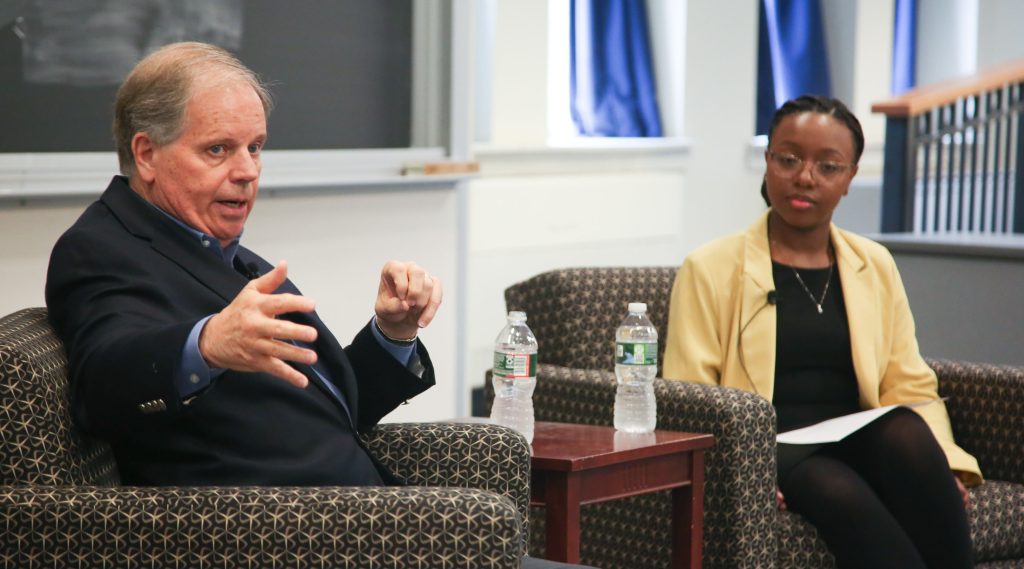On April 26, his final day as the Rappaport Distinguished Visiting Professor, former Senator Doug Jones took the stage at Boston College Law School to discuss his experience advising then-Supreme Court nominee Ketanji Brown Jackson through a particularly brutal Senate confirmation process. Prior to serving one term as a US Senator from Alabama, Jones made history by successfully convicting two of the perpetrators of the 1963 16th Street Baptist Church bombing in Birmingham, Alabama. At the time, Jones was serving as US Attorney for the Northern District of Alabama.
In a conversation with Praise Tillman ’24, incoming co-president of BC Law’s Black Law Students Association (BLSA), Jones recounted the days leading up to the Senate hearing and Jackson’s historic confirmation. Justice Jackson’s mother-in-law, Pamela Jackson, was in attendance, as were Jones’s wife Louise Jones and former US attorney Don Stern.
Jones explained that although he predicted Justice Stephen Breyer would retire, he never expected to be tapped by the Biden administration to act as the “sherpa” for the nominee to fill Breyer’s spot on the bench. Jones got the news in the waiting room of a doctor’s office. He received an email from a reporter inquiring about his name being mentioned as the sherpa, which prompted Jones to contact White House Chief of Staff Ron Klain to offer his services.
From the time he heard from the reporter to the time he filled out the official paperwork, only a day had passed. “It just happened; I mean, it just happened that quick,” Jones said.
The administration kept a short list of potential appointees long before Justice Breyer announced his retirement on January 27. “A lot of people think these processes start when a justice retires, and the White House rolls into action. Not the case,” Jones said. “This process was well underway when I got the call.”
Once Jackson was nominated, Jones set about preparing two separate strategies. The first was to refamiliarize Jackson with her past—once someone becomes a Supreme Court nominee, their entire life and previous work is scrutinized under a microscope.
“It’s amazing what you forget about your own life until somebody puts it in front of you,” Jones said.
The second strategy was preparing to meet with senators on Capitol Hill. Jones explained that he and Jackson made the rounds, eventually connecting with 97 of the 100 sitting senators. Before speaking with each representative, Jackson studied facts about their personal lives and their interests to build relationships before the vote.
Tillman asked Jones if he was able to tell after a meeting with a senator which way they would vote. “Yes and no,” he said. “You knew going in, if they’re a Democrat, you’re in pretty good shape. If they’re a Republican, not so much. That’s just the world we’re living in today,” Jones said, adding that he believes some Republican senators thought carefully about their votes after meeting with Judge Jackson.
“What I didn’t fully appreciate until I met her was how inspirational this woman was going to be,” Jones said. “She became an inspiration to so many people, not just young Black women, but inspiration to people across this country.” Tillman concurred, exuding enthusiasm for soon-to-be Supreme Court Justice Ketanji Brown Jackson.
Attendees at the BC Law event had the opportunity for a question-and-answer session with the former senator.
One asked Jones about potential challenges Jackson might face among the other justices. “She’s going to face a lot of headwinds because she is the type of judge that loves consensus,” he said. “If the other justices can play well in the sandbox, they’re going to find somebody with them who is really going to try to help do that.”
Notwithstanding Jones’s view that some senators used the confirmation hearing as a stage for their own political aspirations, he still finds value in such meetings.
“People do play for the cameras, there’s no question about it,” Jones said. “I think I have to err on the side of transparency. I am glad [the American public] got to see Ketanji Brown Jackson and the kind of justice they’re going to get from the US Supreme Court.”
Tillman ended the conversation with a question about the environment when the successful vote to confirm Jackson to the Court was announced.
“It was electric. I mean, it was truly electric,” Jones said, describing the emotion on the floor of the senate.“You saw the cheers, what you didn’t see were the tears,” he said.
“It was one of the most remarkable moments I think the Senate will have for many, many years to come.”


